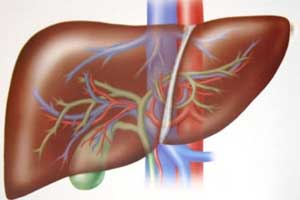- Home
- Editorial
- News
- Practice Guidelines
- Anesthesiology Guidelines
- Cancer Guidelines
- Cardiac Sciences Guidelines
- Critical Care Guidelines
- Dentistry Guidelines
- Dermatology Guidelines
- Diabetes and Endo Guidelines
- Diagnostics Guidelines
- ENT Guidelines
- Featured Practice Guidelines
- Gastroenterology Guidelines
- Geriatrics Guidelines
- Medicine Guidelines
- Nephrology Guidelines
- Neurosciences Guidelines
- Obs and Gynae Guidelines
- Ophthalmology Guidelines
- Orthopaedics Guidelines
- Paediatrics Guidelines
- Psychiatry Guidelines
- Pulmonology Guidelines
- Radiology Guidelines
- Surgery Guidelines
- Urology Guidelines
Terlipressin more effective than noradrenaline in patients with hepatorenal syndrome

Infusion of terlipressin in acute-on-chronic liver failure (ACLF) patients with hepatorenal syndrome-acute kidney injury (HRS-AKI) resulted in improved survival and earlier and higher response than noradrenaline, according to a study published in the journal Hepatology.
HRS carries a high short‐term mortality in patients with cirrhosis and ACLF. Terlipressin and noradrenaline are routinely used and found to be equally effective in cirrhosis with HRS. Vinod Arora, Department of Hepatology, Institute of Liver and Biliary Sciences, New Delhi, India, and colleagues conducted the study to compare the efficacy of terlipressin with noradrenaline in ACLF patients with HRS.
The treatment of hepatorenal syndrome has been focused on patients with decompensated cirrhosis. However, HRS related to acute-on-chronic liver failure is quite common in clinical practice, and little is known regarding the efficacy of vasoconstrictor therapy in this population.
In this open-label randomized controlled trial, ACLF patients with HRS-AKI were randomized to albumin with the infusion of noradrenaline (0.5‐3 mg/hr) (n=60) or terlipressin (2‐12 mg/d) (n=60). The course of AKI, response to treatment and outcome were then studied.
Also Read: Antibiotic Combination Increases Acute Kidney Injury Risk In Hospitalised Children
Key Findings:
- Baseline characteristics including AKI stage and sepsis‐related HRS‐AKI were comparable between the groups.
- Compared to noradrenaline, terlipressin achieved greater day4 (26.1% vs.11.7%) and day 7 (41.7% vs. 20%) response.
- Reversal of HRS was also better with terlipressin (40% vs.16.7%)with a significant reduction in the requirement of renal replacement therapy(56.6% vs. 80%,p=0.006)and improved 28‐day survival (48.3% vs. 20%).
- Adverse events limiting the use of drugs were higher with terlipressin than noradrenaline [23.3% versus 8.3%] but were reversible.
- On multivariate analysis, high MELD (OR 1.10, CI=1.009‐1.20,p=0.03) and noradrenaline compared to terlipressin (OR 3.05,CI=1.27‐7.33,p=0.01)predicted non‐response to therapy.
- Use of noradrenaline compared to terlipressin was also predictive of higher mortality (HR 2.08, CI=1.323.30,p=0.002).
"Acute kidney injury in ACLF carries a high mortality. Infusion of terlipressin gives earlier and higher response than noradrenaline with improved survival in ACLF patients with HRS‐AKI," concluded the authors.
For further reference log on to https://doi.org/10.1002/hep.30208

Disclaimer: This site is primarily intended for healthcare professionals. Any content/information on this website does not replace the advice of medical and/or health professionals and should not be construed as medical/diagnostic advice/endorsement or prescription. Use of this site is subject to our terms of use, privacy policy, advertisement policy. © 2020 Minerva Medical Treatment Pvt Ltd